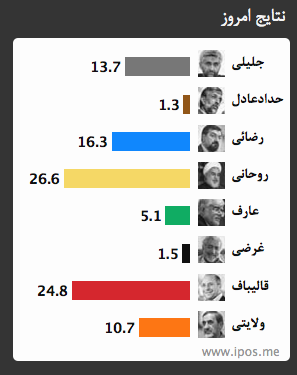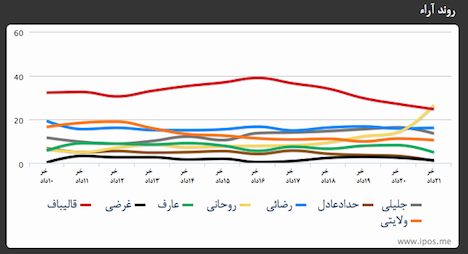Polling is an inexact science in Iran, so most polls should be taken with a healthy dose of skepticism. ![]()
But the field poll data coming from the U.S.-based Information and Public Opinion Solutions is more reliable than most, even though it’s not based in Tehran, because it conducts daily telephone interviews with a sample of over 1,000 potential voters within Iran.
The bottom line is that a runoff seems increasingly likely and, although that runoff seems likeliest to be a faceoff between conservative Tehran mayor Mohammad Baqer Qalibaf and moderate Hassan Rowhani, that’s by no means a certainty. I continue to believe that any of the five leading candidates could ultimately wind up in the runoff, especially if former longtime foreign minister Ali Akbar Velayati withdraws from the race in the next 48 hours in favor of Iran’s top nuclear negotiator Saeed Jalili, which remains a possibility, given that both candidates are viewed has having the closest ties to Ali Khamenei, Iran’s Supreme Leader since 1989. That’s especially true if you believe that the 2009 presidential vote was subject to massive electoral fraud — in such case, it seems possible that Rowhani could be excluded through chicanery. But despite the fact that he’s the most reformist of the six remaining candidate, Rowhani is the only cleric in the race, he has a solid relationship with Khamenei.
The latest results show Rowhani moving for the first time into the lead with 26.6% of the vote at the same time that former presidents Hashemi Rafsanjani and Mohammed Khatami have endorsed him. Rafsanjani, a political moderate, had registered to run for president in the election, but he was disqualified by the Guardian Council, a 12-member body close to the Supreme Leader that certifies candidates to run for office in Iran. The reformist Khatami, who had supported Rafsanjani’s presidential bid, indicated his support for Rowhani after his former vice president Mohammad Reza Aref dropped out of the race on Monday in favor of Rowhani. Rowhani’s support has steadily increased from a poll last week that showed him with just 8.1%. (Online polls have shown Rowhani and Aref with much wider support, but those seem skewed toward wealthier, more urban voters likelier to support more liberal candidates like Rowhani and Aref).
For the first time in an IPOS poll, the more ‘principlist’ conservative mayor of Tehran, Mohammad Baqer Qalibaf, has slipped into second place. Despite Qalibaf’s position as a conservative, he’s been a relatively popular mayor and is expected to do well among voters in Tehran, which is home to over 12 million of Iran’s 75 million people. Last week, however, Qalibaf held a much wider lead with 39% of the vote, though his lead seems to be shrinking as more undecided voters (57% of all voters last week) ultimately choose a candidate to support:
The third-place candidate, according to the poll, is Mohsen Rezai, whose support seems to be incredibly stable — 16.3% today and 16.6% last week. Rezai, the former head of the Revolutionary Guards, is seen as a more independent-minded conservative, and he pulls much of his strength from rural Iran and from within Iran’s military forces.
The poll has routinely shown Jalili, Iran’s top negotiator with respect to its nuclear energy program, far behind — 13.7% today, down from 13.9% last week. That places IPOS’s poll at odds with domestic and international media reports that Jalili is a frontrunner in the race, though it would hardly be the first time that an anointed frontrunner failed to win Iran’s presidency — both Khatami in 1997 and incumbent Mahmoud Ahmadinejad in 2005 were initially views as unlikely dark-horse candidates.
Velayati, Iran’s foreign minister from 1981 to 1997 and currently a top international affairs advisor to the Supreme Leader, languishes in fifth place with 10.7% of the vote, down from 11.5% last week.
The results do have an intuitive logic: Qalibaf has a natural constituency in Tehran, Rezai has a natural constituency among rural voters, and Rowhani appears to be consolidating the moderate and reformist voters who had initially rallied behind Rafsanjani. On the contrary, neither Jalili nor Velayati have held top elective offices in Iran, and both are associated with the status quo — some reports even suggest that Jalili is Ahmadinejad’s preferred candidate, which may be harming him in light of dissatisfaction with Ahmadinejad over Iran’s crumbling economic state and its international isolation.
Despite the fact that the Supreme Leader may prefer Jalili and Velayati to the other major principlist candidate, Qalibaf, it’s reasonable to understand why Jalili and Velayati might be languishing, though there’s still time for Velayati to drop out of the race (and he indicated weeks ago he might well do so in favor of Velayati). Another principlist candidate, former parliamentary speaker Gholam Ali Haddad-Adel, dropped out of the race on Monday to prevent even further splintering among conservative voters.

